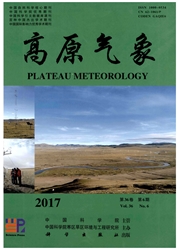

 中文摘要:
中文摘要:
In order to further understand the land surface processes over the northern Tibetan Plateau, this study produced an off-line simulated examination at the Bujiao site on the northern Tibetan Plateau from June 2002 to April 2004, using the Noah Land Surface Model(Noah LSM) and observed data from the CAMP/Tibet experiment. The observed data were necessarily corrected and the number of soil layers in the Noah LSM was changed from 4 to 10 to enable this off-line simulation and analysis. The main conclusions are as follows: the Noah LSM performed well on the northern Tibetan Plateau. The simulated net radiation, upward longwave radiation, and upward shortwave radiation demonstrated the same remarkable annual and seasonal variation as the observed data, especially the upward longwave radiation. The simulated soil temperatures were acceptably close to the observed temperatures, especially in the shallow soil layers. The simulated freezing and melting processes were shown to start from the surface soil layer and spread down to the deep soil layers, but they took longer than the observed processes. However, Noah LSM did not adequately simulate the soil moisture. Therefore, additional high-quality, long-term observations of land surface–atmosphere processes over the Tibetan Plateau will be a key factor in proper adjustments of the model parameters in the future.
 英文摘要:
英文摘要:
In order to further understand the land surface processes over the northern Tibetan Plateau, this study produced an off-line simulated examination at the Bujiao site on the northern Tibetan Plateau from June 2002 to April 2004, using the Noah Land Surface Model (Noah LSM) and observed data from the CAMP/Tibet experiment. The observed data were neces- sarily corrected and the number of soil layers in the Noah LSM was changed from 4 to 10 to enable this off-line simulation and analysis. The main conclusions are as follows: the Noah LSM performed well on the northern Tibetan Plateau. The simulated net radiation, upward longwave radiation, and upward shortwave radiation demonstrated the same remarkable annual and seasonal variation as the observed data, especially the upward longwave radiation. The simulated soil temperatures were acceptably close to the observed temperatures, especially in the shallow soil layers. The simulated freezing and melting processes were shown to start from the surface soil layer and spread down to the deep soil layers, but they took longer than the observed processes. However, Noah LSM did not adequately simulate the soil moisture. Therefore, additional high-quality, long-term observations of land surface-atmosphere processes over the Tibetan Plateau will be a key factor in proper adiustments of the model parameters in the future.
 同期刊论文项目
同期刊论文项目
 同项目期刊论文
同项目期刊论文
 期刊信息
期刊信息
